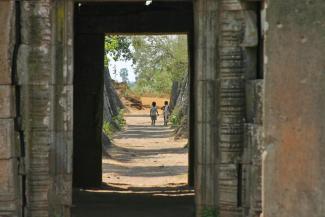Summer Special
Horror witnessed by a child

Two things will always be associated with Cambodia: its golden Angkor period, when it was a very powerful kingdom more than 500 years ago, and the genocidal Khmer Rouge regime 40 years ago. Almost all tourists visit the impressive ruins of Angkor in Cambodia, above all Angkor Wat, the largest religious monument in the world. It’s the country’s national symbol and its people’s pride.
Far less tourists want to see the dark side, Cambodia’s national trauma. Those who do, visit former killing fields, look into mass graves and wander through torture chambers. The terror regime that ruled from 1975 to 1979 left an estimated 2 million people dead. One out of four to five Cambodians was killed.
Another way to approach this unimaginable mass murder – without even visiting the country – is offered by movies, the most famous being “The Killing Fields” from 1984, and by books. Numerous authors have tackled the issue: political scientists, historians, lawyers – and survivors like Loung Ung.
“First they killed my father” starts when Loung is five years old. In April 1975, Khmer Rouge soldiers march into her hometown of Phnom Penh, where Loung’s upper middle-class family leads a comfortable live. At that moment, Loung’s privileged childhood abruptly ends. The Khmer Rouge evacuate the city. Next comes a long, exhausting march to the countryside.
Ideologically, the Khmer Rouge emulated the ideas of Maoist communism. They wanted to turn intellectuals and members of the bourgeoisie into workers and peasants. They destroyed traditions, religion and the family as an institution, replacing all that with “Angka”, the “organisation” – a mysterious power steered by the Communist Party. They systematically destroyed families like Loung’s.
Going through hell, little Loung and her parents, siblings, uncles, aunts and cousins experience everything that marks their nation’s fate under Pol Pot: starvation, forced labour, torture, psychological violence, death. The author describes everything in simple language and – in line with the child’s perspective – without much analysis or classification. When the Vietnamese invade Cambodia at the end of 1978 and topple the regime, Loung has lost her mother, father, two sisters and about 20 other relatives.
Despite the horrific events, there is hope, thanks to the little girl’s will to live. She is strong, resilient and adaptive. The Khmer Rouge notice her qualities and train her as a child soldier while her siblings have to work in labour camps. Loung is eager to escape the horror and fights to get along.
In the aftermath of the Vietnamese invasion, Loung is able to flee from her military camp. She reunites with several family members in a refugee camp and is finally taken to Thailand via Vietnam by her elder brother Meng. In 1980, she travels on to the USA where she still lives today.
Her experience turned her into an author that copes with trauma by writing. She became an activist too. Loung Ung wants to improve the living conditions in her native country. She fights for women’s rights and against the use of child soldiers, and she was the national spokesperson for the Campaign for a Landmine-Free World.
Loung Ung continued to tell her story in two more memoirs: “Lucky Child” and “LuLu in the Sky”. However, neither was as successful as “First they killed my father”, which was translated into nine languages and won the award for “Excellence in Adult Non-fiction Literature” from the Asian/Pacific American Librarians Association in 2001. Angelina Jolie has announced that she will direct a movie based on the book. Katja Dombrowski








